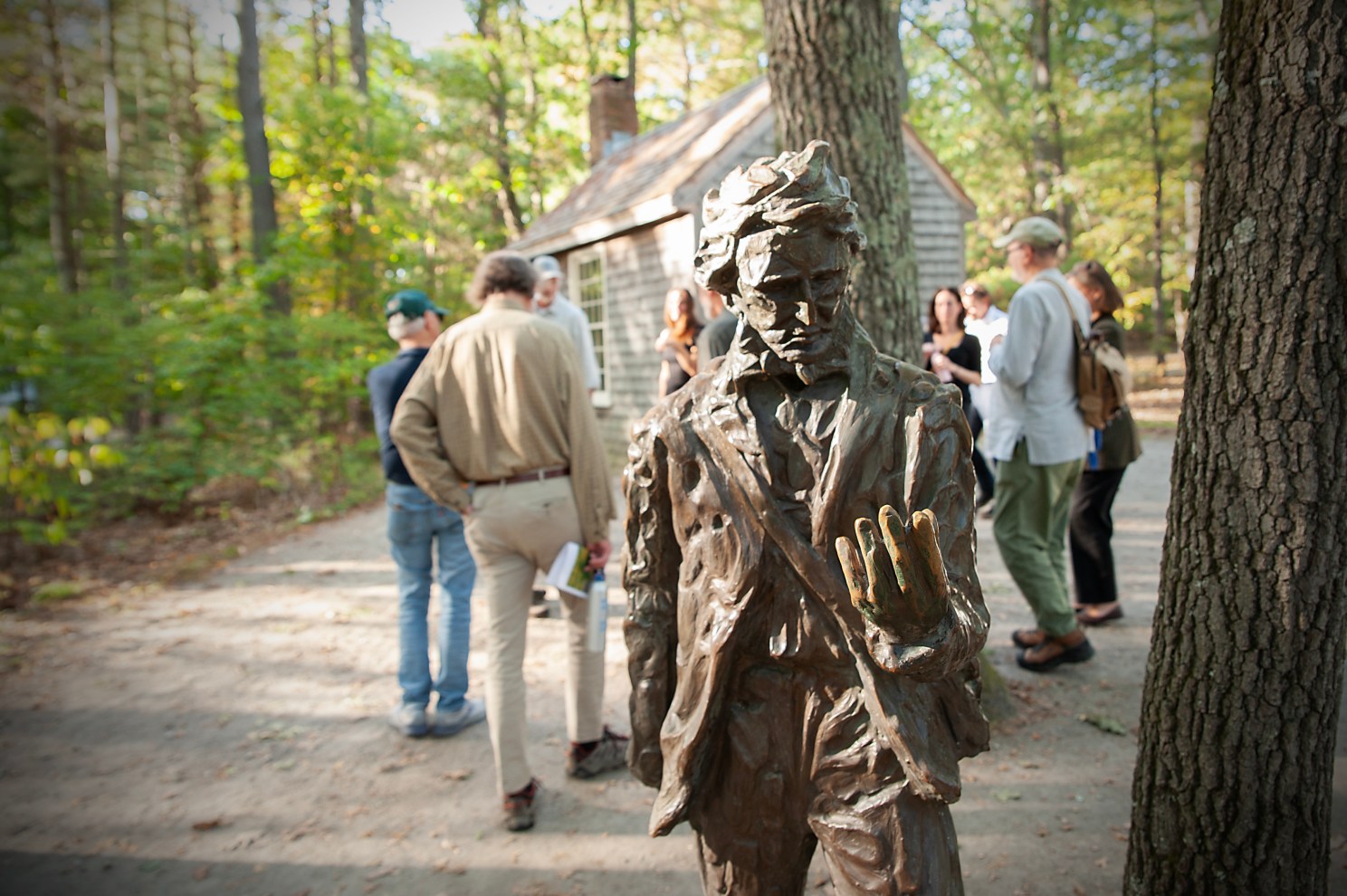Exploring the living legacy of Transcendentalism: Concord summit gathers leaders in the field

Scholars, practitioners, and artists, from a two-day Transcendentalism workshop in Concord, hosted by the CSWR, gather at the replica of Henry David Thoreau’s home at Walden Pond.
Photo by Jeffrey Blackwell
In the mid-1830s, a group of New England Unitarian ministers, writers, philosophers, and intellectuals, including Ralph Waldo Emerson, Amos Bronson Alcott, Margaret Fuller, Elizabeth Palmer Peabody, and Henry David Thoreau, along with other thought leaders of what came to be known as the Transcendentalist movement, met in Concord, Massachusetts, to discuss the society of their age. The group was called the Transcendental Club or “the Brotherhood of the Like-Minded.” Through those meetings and the publication of their journal, The Dial, it provided a platform for intellectual thought and discussion.
The Center for the Study of World Religions at Harvard Divinity School (CSWR) organized a collaborative two-day workshop in October, examining the legacy and future of Transcendentalism in an open discussion reminiscent of those spirited meetings of the Transcendentalists nearly 200 years ago.
“We are trying to convene these conversations precisely so that the people most invested in Transcendentalism as a living legacy can help to set our bearings for what the study of Transcendentalism, today and in the future, can and should look like,” said Russell Powell, CSWR research affiliate for the Transcendentalism Initiative.
Nearly 30 scholars, practitioners, artists, and others from across the United States and Europe gathered at the Concord Museum where Thoreau’s desk and wooden flute are on display. The museum is located in the heart of town, which gave birth to the Transcendentalist community, about three miles from Thoreau’s Walden Pond, a block from Emerson’s home, and a short walk from Sleepy Hollow Cemetery, where many of the Transcendentalists are buried.
“We were trying to gather scholars of Transcendentalism who we suspected were also not just scholars of, but part of the tradition that we’re committed to carrying forward,” said Charles Stang, director of the Center for the Study of World Religions, and professor of Early Christian Thought at the Harvard Divinity School.
The workshop format included talks, panels, small group discussions, and experiential opportunities around Concord, all aimed at discovering a pathway from scholarship to the practical application of Transcendentalist philosophy.
“The workshop’s format is reminiscent of Margaret Fuller’s ‘Conversations’ in Boston (1839–1844), where, as a pioneering editor of The Dial and a member of the Transcendentalist Club, she fostered open, participatory discussions, or ‘nucleus of conversation,’” said CSWR Executive Director Gosia Sklodowska.
The conference was not designed to announce discoveries or uncover history. It was a deep dive into the possibilities of bringing light to a historical, philosophical, and practical movement that could provide valuable insight in this challenging moment in history. It also took an experiential dive into local sites connected to the Transcendentalists, including tours of Walden Pond, the Concord Museum, Ralph Waldo Emerson’s home, October Farm Riverfront Trail, and Sleepy Hollow Cemetery.
Robert Thorson, a geologist and professor of Earth sciences at the University of Connecticut, and author of “The Guide to Walden Pond,” led a tour of Walden Pond, where Thoreau lived alone for two years. The experience formed the basis for Thoreau’s 1854 book “Walden; or, Life in the Woods.”
“[Thoreau] was there digging holes and climbing hills and swimming in the pond. He saw quite a bit of that northwest quadrant, like it is today,” Thornson said. “I’m trying to get across to the group that the geology matters. … It called to Thoreau in his writing and would have given rise to a different text if he had written it somewhere else.”
Eastern Massachusetts is central to the Transcendentalist movement. Emerson and Thoreau were from Concord and both graduated from Harvard; the Transcendentalist Club sometimes met in Boston, and a group of them even started a community in West Roxbury, Brook Farm.
Susan Shumaker, a producer and story developer with Florentine Films and Ewers Brothers Productions, recently completed a documentary about Henry David Thoreau, executive produced by Ken Burns and Don Henley. She said she was drawn to the conference in part because of the scholars attending and the workshop’s location in Concord.
“I have come to know much of this cast of characters over the last five or maybe six years that I’ve been working on the film, and have just fallen in love with this community and with this study,” she said. “I hope there is a way to bring people back into connection with self, with nature, with the world, … It’s that interconnection with people and places, the land, trees, and — from that connection — living justly on the land: caring for others, caring for our planet.”




